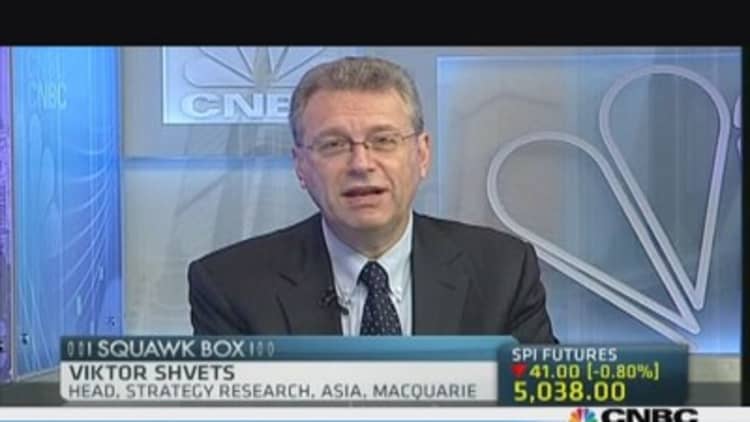
Emerging markets are just a few economic data releases away from seeing a "flash flood" of funds returning to their battered shores, one strategist tells CNBC.
Viktor Shvets, head of Asia strategy research at Macquarie bank, said the underlying assumption that developed markets are doing better than their emerging market peers, fueling the drain of cash from countries such as Brazil, Turkey, India and Indonesia, could change if U.S. and European data worsen.
"It is quite possible that we are only two or three economic numbers away from the whole process reversing itself and money coming back into emerging markets," Shvets told CNBC Asia's "Squawk Box" on Thursday. "It could be like a flash flood."
"Let's assume that refinancing activity in the U.S. drops another 20 or 30 percent, that housing numbers weaken over the next two to three months and that the PMI [Purchasing Managers' Index for manufacturing] in Europe dips again, what you will find is that bond yields are going to retreat relatively quickly and as they retreat the money will return back [to emerging markets]," he said.
(Read more: Which emerging market stocks have it the worst?)
The Mortgage Bankers Association said on Wednesday that applications for U.S. home loans fell for a second straight week and higher interest rates reduced refinancing activity.
Expectations for an unwinding of the Federal Reserve's asset-purchase program have pushed up Treasury yields and sparked an outflow of cash from emerging markets. The benchmark 10-year Treasury yield is hovering at its highest level in two years at about 2.936 percent.
Emerging market equities saw outflows of $761 million in the week ending August 14, while $1.3 billion went into developed market funds, according to Citi.
(Read more: Unlocking the playing field for emerging markets)
Shvets, however, said it wasn't very long ago when emerging market assets were attractive, saying "only three months ago people were snapping up Indonesian bonds at 5 percent, today they're almost 9 percent."
"So my point is that it's an unstable world," Shvets added.
Growth in the West in question
Jim Walker, founder and CEO of Asianomics, meanwhile, said rising Treasury yields could actually hinder U.S. economic growth.
"Personally I'll be buyer of it [Treasurys] at 3.5 percent, because I think by that time you can say good bye to the U.S. recovery – the housing market will fall flat if we get to 3.5 percent on the 10-year Treasury [yield]," Walker said.
(Read more: US existing home sales jump to 3-year high)
Walker sees Europe as the biggest risk to global growth, saying recent asset allocations to European markets are misleading.
"European credit growth, loan growth is actually still declining at an even faster rate than it was two years ago – the central bank there has actually reduced its balance sheet rather than increased it," Walker said. "I think the financial institutions there are still very bad assets – that's where the problems will arise if interest rates back up."
— By CNBC.com's Rajeshni Naidu-Ghelani. Follow her on Twitter @RajeshniNaidu

